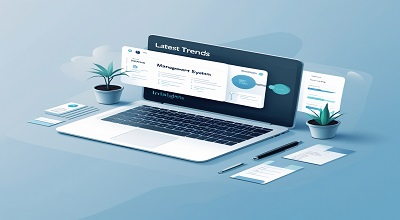LMS for Professional Growth
LMS for Professional Growth: In today’s fast-evolving professional landscape, continuous learning is no longer optional—it’s a necessity. A Learning Management System (LMS) has become a cornerstone for professional growth, offering structured, scalable, and flexible learning solutions.
Whether you’re an educator, corporate trainer, or an individual looking to upskill, leveraging an LMS can streamline your learning journey. This blog explores the latest trends, benefits, and best practices in using an LMS for professional development.
What is an LMS?
A Learning Management System (LMS) is a digital platform designed to create, deliver, track, and manage training and educational programs. It serves as a centralized hub for e-learning, offering features like:
- Course creation & management
- Progress tracking & reporting
- Interactive assessments
- Mobile learning access
LMS platforms are widely used in schools, universities, corporate training, and professional certification programs.
Why Use an LMS for Professional Growth?
Personalized Learning Paths
An LMS allows professionals to customize their learning experience based on their career goals, skill gaps, and preferred pace.
Cost-Effective Training
Compared to traditional in-person training, an LMS reduces costs associated with travel, printed materials, and venue bookings.
Accessibility & Flexibility
With mobile-friendly LMS platforms, learners can access courses anytime, anywhere, making continuous learning seamless.
Skill Certification & Compliance
Many industries require mandatory certifications. An LMS ensures compliance by tracking course completions and issuing certificates.
Data-Driven Insights
LMS analytics help organizations identify skill gaps, measure training effectiveness, and optimize learning strategies.
Key Features of a Modern LMS
The best LMS platforms offer:
✅ User-Friendly Interface – Easy navigation for learners and admins.
✅ Gamification – Badges, leaderboards, and rewards to boost engagement.
✅ AI-Powered Recommendations – Personalized course suggestions.
✅ SCORM & xAPI Compliance – Supports industry-standard e-learning content.
✅ Social Learning Tools – Discussion forums, peer reviews, and collaboration features.
✅ Multi-Language Support – Essential for global organizations.
Latest Trends in LMS for Professional Development
Microlearning & Bite-Sized Courses
Short, focused modules improve knowledge retention and fit into busy schedules.
AI & Adaptive Learning
AI-driven LMS platforms adjust content based on learner performance.
Virtual & Augmented Reality (VR/AR)
Immersive training simulations for high-risk industries (healthcare, engineering).
Mobile-First Learning
Responsive LMS designs ensure seamless learning on smartphones and tablets.
Integration with HR & Productivity Tools
LMS platforms now integrate with Zoom, Slack, Microsoft Teams, and HR software for streamlined workflows.
Top LMS Platforms for Professional Growth
| LMS Platform | Best For | Key Features |
|---|---|---|
| Moodle | Academic & Corporate | Open-source, highly customizable |
| TalentLMS | Small Businesses | User-friendly, affordable |
| LearnDash (WordPress) | Online Course Creators | Powerful course builder |
| Docebo | Enterprises | AI-driven, scalable |
| Blackboard Learn | Higher Education | Robust assessment tools |
How to Choose the Right LMS for Your Needs?
- Define Your Goals – Corporate training, academic use, or personal development?
- Check Scalability – Can it grow with your organization?
- Evaluate Pricing Models – Subscription, one-time purchase, or freemium?
- Test User Experience – Is the interface intuitive?
- Look for Integrations – Does it work with your existing tools?
Case Studies: Successful LMS Implementation
1: IBM’s AI-Powered LMS
IBM reduced training costs by 40% using an AI-driven LMS that personalized learning paths for employees.
2: Coursera for Business
Companies like Google and PwC use Coursera’s LMS to upskill employees in data science, AI, and leadership.
Challenges and Solutions in LMS Adoption
- Challenge: Low learner engagement
- Solution: Gamification & interactive content
- Challenge: Technical difficulties
- Solution: Opt for cloud-based LMS with 24/7 support
- Challenge: High implementation cost
- Solution: Start with a freemium LMS and scale up
Future of LMS in Professional Development
The LMS industry is evolving with:
- Blockchain for credentialing – Secure, verifiable digital certificates.
- Voice-Activated Learning – AI assistants for hands-free learning.
- Predictive Analytics – Forecasting skill demands before they arise.
Conclusion
An LMS is a powerful tool for professional growth, offering flexibility, cost savings, and data-driven insights. By staying updated with the latest trends, professionals and organizations can maximize their learning potential.
For more insights on e-learning and teacher development, visit TeacherEducator.com.
FAQs
Q1: Can an LMS be used for freelancers?
Yes! Many freelancers use LMS platforms like Teachable and Thinkific to upskill and certify their expertise.
Q2: Is an LMS suitable for small businesses?
Absolutely! Affordable LMS options like TalentLMS and LearnDash cater to small teams.
Q3: How does gamification improve LMS engagement?
Badges, points, and leaderboards motivate learners by adding a competitive element.
